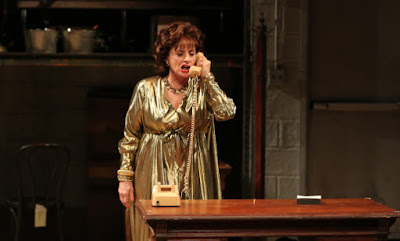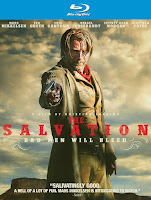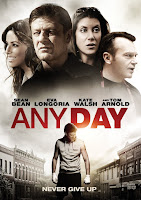- Details
-
Parent Category: Film and the Arts
-
Category: Reviews
-
Published on Tuesday, 21 July 2015 22:13
-
Written by Kevin Filipski
Blu-rays of the Week
Can't Stand Losing You—Surviving the Police
(Cinema Libre)
This terrific music documentary, told mainly in the words and photographs of guitarist Andy Summers, presents a highly condensed, opinionated history of The Police, the world's biggest early '80s rock band, that features backstage and onstage footage of the band's 2007-8 reunion tour.
Although Sting is the villain, as his ego (and composing talent) outgrew the others' until it couldn't be restrained within the group's confines, there's an unspoken question: despite his complaints that Sting had a stranglehold over songwriting, why doesn't Summers tout his own compositions, save for the Grammy-winning "Behind My Camel," with Summers rather than Sting on bass? (We know the answer.) Still, this is an enjoyable journey for Police fans. The movie looks fine on Blu; extras include Summers' commentary, interview and Q&A.
(PBS)
This slow-moving BBC series, about front-line British nurses during World War I dealing with grievously wounded and dying servicemen along with their personal and professional lives, has the usual accomplished acting and production values.
But this not quite prestigious show is merely a superior soap opera with cardboard characters, familiar revelations and cliched relationships. The luminous presence of Oona Chaplin as a young nurse makes its six one-hour episodes watchable despite the flaws. It all looks splendid on Blu-ray.
(Lionsgate)
Writer-director Alex Garland's intelligent sci-fi drama begins promisingly with its storyline about a cyborg endowed with artifical intelligence, Ana, who beguiles and ultimately wins over Caleb, who meets her at his boss's secret hideaway during a week fraught with mysteries that quickly turn moral: and mortal.
Too bad Garland succumbs to a silly showdown that's nothing more than a catfight—a battle of brawn rather than brains—which wrecks his clever set-up; despite all, it's well-acted by Bromhnall Gleeson, Oscar Isaac and especially Alicia Vikander, with first-rate production design and special effects. The film looks gorgeous in hi-def; extras include a 40-minute making-of and an hour-long Q&A with Garland, Isaac and crew.
(Criterion)
Fifty-six years after its premiere, the power of Alain Resnais' debut feature has not diminished; it remains a psychologically penetrating portrait of both a couple and a world scarred by and scared of the possibility of nuclear annihilation.
Brilliantly acted by Emmanuelle Riva, magnificently shot by Sacha Vierny and Mochio Takahashi, and exquisitely scored by Georges Deleure and Giocanni Fusco, Resnais' classic has never looked sharper nor more modern than in its new restoration. Criterion extras include two Riva interviews, two Resnais interviews, film historian Peter Cowie's commentary and a restoration featurette.
Life Is a Bed of Roses
(Cohen Film Collection)
These mid-'80s films by French director Alain Resnais (who died last year at age 91) demonstrate his versatility and, at times, vacuity: 1984's Death, one of his bleakest films, is a chamber drama for four players (led by his future wife Sabine Azema and Pierre Arditi as a couple yearning to be together beyond the grave) that gives great weight to Hans Werner Henze's intense musical interludes.
1983's
Roses, by contrast, is a colossally lightweight affair that is a pretty-looking but pretty uninvolving experience. Both films have been restored nicely, despite some (probably unavoidable) softness in the image; lone extras are commentaries.
Powers—Complete 1st Season
(Sony)
Little House on the Prairie—Complete 6th Season
(Lionsgate)
In a world where humans and superheroes interact, a homicide department investigates superhumans' crimes; the first PlayStation network scripted series, Powers is high-concept, but its healthy skepticism and tongue-in-cheek attitude works well.
The sixth season of the beloved series Little House was originally televised in 1979-80, and its 24 episodes, while touching on Michael Landon's father, Karen Grassle's mother and Melissa Sue Anderson's older sister, concentrate on Melissa Gilbert's Laura, who turns 16, becomes a teacher, helps rebuild the blind school that was destroyed by fire and prepares to get married. Prairie has been restored beautifully for hi-def, and Powers looks equally good on Blu. The lone Prairie extra is a retrospective featurette; Powers extras comprise featurettes, outtakes and deleted scenes.
The Second Best Exotic Marigold Hotel
(Fox)
It's nearly impossible to recreate the charm that the first Exotic Hotel had, but since Hollywood is all about making money, a badly titled sequel was all but assured, and so we have Second Best, which is already admitting its inferiority to the original, despite both being directed by John Madden.
Still, despite many contrivances, overlength (it should be 90 minutes, tops) and a lazy appearance by Richard Gere, the movie floats by on its lovely locations and British regulars Judi Dench, Maggie Smith, Bill Nighy and Penelope Wilton. The movie looks exquisite on Blu; extras are making-of featurettes.
(Arrow USA)
This enticing boxed set collects all five films in the Stray Cat Rock series—comprising Delinquent Girl Boss, Wild Jumbo, Sex Hunter, Machine Animal and Beat 71—all made between 1969 and 1971 by directors Yasuharu Asebe and Toshiya Fujita, whose fast-moving but furious fun unapologetically combines the trashiest aspects of onscreen sex, violence and rock'n'roll.
Starring the delectable Meiko Kaji as the leader of a girl gang, this quintet of undeniably dated flicks is a mish-mash of visual schemes that make for riotous viewing, especially if one can "binge" all five consecutively. The films look great on Blu-ray; extras are interviews.
I Am Femen
(First Run)
Oksana Shachko, a feminist icon in an era that desperately needs one, is endlessly articulate, intelligent and photogenic as she leads a group called Femen, whose public protests in Ukraine and throughout Europe have become a flash point the way the Russian female group Pussy Riot did a few years ago: their topless demonstrations have brought publicity and notoriety to their brave stances against oligarchy and authoritarianism.
Alain Margot's fascinating documentary follows the anarchic activist Oksana as she unblinkingly puts her body and her life on the line for justice, along with a group of equally like-minded young women.
(KimStim)
Set on a ship traveling to Antartica, Scott Cohen's atmospheric feature debut takes the pulse of a married couple's relationship, if rather too blatantly spelling out its themes via symbolic icy waters, forbidding terrain and a glimpse of Roman Polanski's own debut film Knife in the Water on a laptop.
Despite such baggage, the movie is quietly hauntingy thanks to Olivia Thirlby as the wife: she's an underrated actress of dignity and grace; Vincent Kartheiser (the husband) and Billy Campbell (the ship's captain) are also fine. Kudos to Michael Simmonds' location photography and Garth Stevenson's moody music; extras are brief featurettes.
(Warner Archive)
In Samuel Fuller's rip-roaring 1957 western, an unrepentent Confederate soldier (Rod Stieger) befriends Sioux Indians and becomes an important ally in their ongoing skirmishes with the U.S. Army, which is in the process of allowing settlers from the East to have their manifest destiny.
Though there is some dreadfully wooden acting and unintentionally funny diaogue, Fuller's gritty direction and Steiger's zesty performance make this sturdily watchable; that it clocks in at a fast-paced 85 minutes surely helps.
(Zeitgeist)
A documentarian who has been filming weddings as a side gig for the past two deacdes, Doug Block has shot no less than 112 ceremonies of The Big Day, finding himself bonding with many couples only to never see or hear from them again.
Now, by catching up with several of his favorites, he discovers that, as one might expect, their lives have been changed by their marriages, usually in ways they never expected; interviews with his honest subjects are juxtaposed with joy-filled footage from their weddings. Extras include interviews and a Q&A.
Reynaldo Hahn—Chamber Music
(Timpani)
Born in 1874 in Caracas to a German Jewish father and Venezuelan mother, Reynaldo Hahn grew up in France, and his music has the stylish refinement of his adopted homeland: several of his extremely attractive works, including the four chosen for this disc, show off a beguiling ear for variously odd—but exactingly thought-out—combinations of instruments.
The charming opener, Le Bal de Beatrice d'Este, is a buoyant ballet for 15 players, while the elegant closer Divertissement pour une fete de nuit is another sophisticated workout for flute, saxophone, bassoon, horn, percussion, string quartet and piano. The musicians perform these and Hahn's tastefully constructed Concerto provencal and Serenade with obvious enjoyment, making listeners hear the composer’s aesthetic of beauty in music.












































